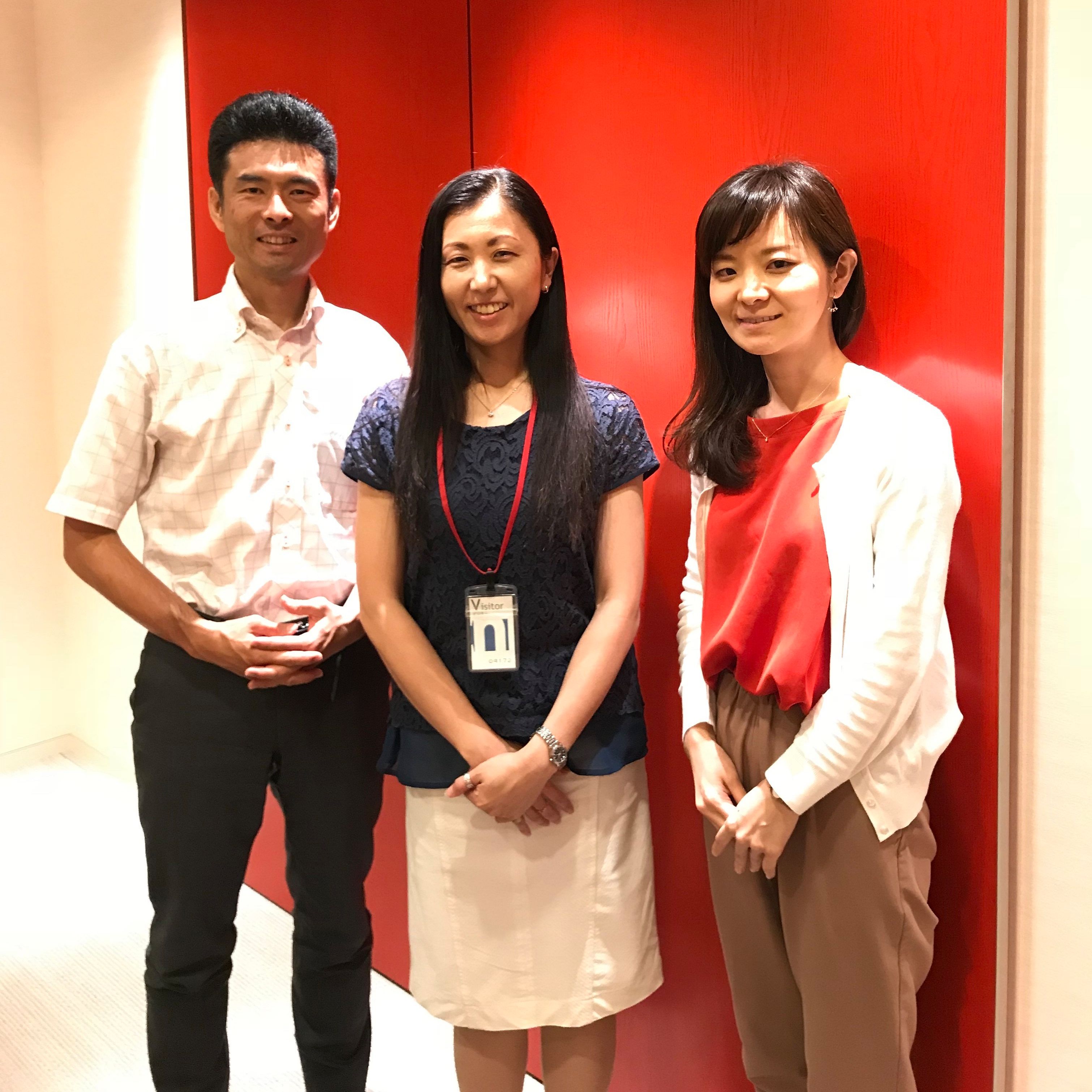End-of-Life Care Association of Japan
FIT For Charity 2017 beneficiary organisation End-of-Life Care Association of Japan (“ELC”) trains and develops caregivers who look after people towards the end of their life. They conduct various awareness-raising activities in our society which is characterised by a high proportion of elderly people as well as a declining population.
We met with Ms. Keiko Chida, General Manager of ELC.

From left to right, Mr Ryo Yamasaki (FIT Communications team), Ms. Keiko Chida (General Manager of ELC) and Ms. Mihoko Soeda (FIT Communications team)
FIT: Can you tell us what led you to start EL C?
Chida: In 2013, with a little more than 10 years to year 2025, by when the entire baby-boomer generation would become late-stage elderly,
Director Ozawa began activities to develop professional caregivers who look after people toward end of life. The trend is that while the working population will continue to decrease, the proportion of elderly people will increase. Meanwhile, more and more people want to continue living in their familiar environment, such as their home or a nursing facility, while being treated for diseases and eventually facing the end of their lives. Approximately 70% of the population in Japan today dies in hospitals; however, considering the fact that this proportion will change in the future, there is a shortage of caregivers in the area who can take care of those in need. We felt the need to address this issue not only in the immediate reach of Dr Ozawa but to develop caregivers on a national level, and in 2015, we established ELC.
FIT: What led you personally to join ELC?
Chida: I met Dr Ozawa around the time I lost my parents. Originally, I was involved in training and development as well as new business development for large companies, so I made use of that experience and got involved with ELC from the stage of conceptualisation.
I was listening at first with the intention of supporting the setup; however, at the same time I realised that this is my issue, and before I noticed I was absorbed in setting up ELC with the support of others.
FIT: After the initial setup, what drove you to get more deeply involved in ELC’s activities?
Chida: Firstly, through our activities, we saw changes in individuals who joined our programs and the way people who had been struggling on their own started to get connected beyond their neighbourhood; this is when I felt that I was involved in something that is truly needed in society. Secondly, I think I started to realise that everything I had experienced was meaningful, including my work experience and the death of my parents. When I was doing long-distance nursing care of my father who had an incurable disease, I constantly had a sense of not doing a proper job, and was very dissatisfied with myself. After losing my father and my mother in short succession, I questioned myself and what I had been working for, and felt a gaping hole in my heart. Through the encounter with Dr Ozawa and through the activities of ELC, I was able to have a positive feeling about myself, facing how I was and I could say “I may not be perfect, but I am good enough”.
While going through this experience, I realised there were many around me who faced similar challenges of caring for their parents and facing their death, and I started to think that my experience may be helpful to them. I think this is a topic everyone will face one day; however, it is easy to simply turn away your eyes. Therefore, through the activities of the ELC, I would like to help people understand how to cope when a difficult challenge suddenly strikes. The topic needs to be customised when communicating with different target audiences.
FIT: Can you tell us about ELC’s activities?
Chida: Our main activity is delivering an end-of-life caregiver basic training course, a two-day program designed to provide those who, in today’s super-aged society, give care to people facing the final stage of life and learn how they can help those at the end of their life to live calmly. For children, we deliver a lecture called Lesson of Life, through which we help them learn how to face and deal with suffering. We have the opportunity to talk with various audiences from elementary and secondary school students, vocational school students, preparatory school students, university students, as well as working people and the elderly; however, the message at the core is actually the same. “Even if one faces a suffering that is difficult to resolve, once one notices what supports you through the suffering, regains calmness, and it becomes a source for the next stage of life. Those involved in caring will also regain calmness and tranquillity”. As an organisation, we are now in our fourth year of operation.
FIT: Can you give us more details about the training program you offer?
Chida: Starting with the question “What can I do when encountering someone facing a suffering that is difficult to resolve?” participants learn in concrete terms how to engage. Focusing on desperate situations where encouragement does not help, such as an elderly person who wishes to “die before my family have to take care of my bodily waste” or someone who says “you don’t understand my suffering," we teach that once the suffering person realises that there is even one person who tries to understand his or her suffering, he or she regains calmness through the relationship with that person. Participants in our course learn about this opportunity and proven approaches through case studies and role play.
As mentioned earlier, as more and more people will face their end of life in familiar surroundings like the personal home and elderly facility, and nursing professionals in particular will increasingly face situations where elderly will gradually and naturally go through their final stage of life, encountering death as a “natural withering”, the way we were intended to die. You will spend time with the person concluding life gently, without the life-extending support such as IV drip infusions. Potentially facing a prolonged period of time with the dying, there are many caregivers who ask themselves “what is it that I can do?” and develop an aversion to dealing with the dying. We are helping these professionals to learn how to better communicate by addressing questions such as “how can we listen to the suffering of that person and help us to remain calm?”
FIT: What is the “Lesson of Life” lecture that you deliver to children?
Chida: We talk with the children about how to deal with a suffering that is difficult to resolve, such as what one can do when a close friend is suffering. When you are facing a challenge, it is natural to try to resolve the problem; however, there is suffering that cannot be resolved. For example, suppose your sports team loses a game because of an error that you have made. Time cannot be turned back. You made continue to struggle with questions like “why did I make that mistake? Why me?” without finding an answer. But what can you learn from that suffering? How can you be calm while learning to deal with the suffering? We talk about expressing this in concrete terms. For example, we may not have won this time but I was saved by the warm words from my team mates and coach in the reflection meeting; that we practiced so hard until late at night; that next time, I want to try and trust my team mates more and have them assist more, etc.
"Life is important". The children know that in their head. However, when you are really suffering and no help is in sight, you may at time hurt yourself or someone else. How can you avoid that? You first need to notice your own or someone’s suffering. Then solve what you can solve. And if something cannot be solved, notice that learning from that suffering can support and strengthen you. Even if something isn’t going to plan, to say “I may not be perfect but I am good enough” and accept yourself. What is important in this process is the person that understands your suffering, even if just a single person. We hope that there will be more and more of those sympathetic supporters in the community, from children to the elderly.
FIT: Please tell us about your next plans and ambitions.
Chida: We are currently focusing on developing tools so that ELC-accredited facilitators can deliver the Lesson of Life. Since 2000, Dr Ozawa has delivered over 600 of these lessons to children. At that time, Dr Ozawa was working as a hospice physician and was invited to elementary and other schools, delivering these lessons on his own.
The number of participants of the Association's main project, the end-of-life caregiver basic training course, has reached 3,000 people in the three years since inception, and there are 100 facilitators all over Japan who work on community development. We are trying to ensure that these facilitators can deliver the Lesson of life in each region and community. Since there is a limit posed by Dr Ozawa conducting the lessons on his own, we have begun creating a standardised programme so that other facilitators can also deliver the lesson. We are aiming at completing the programme development by this autumn. On August 19, we plan to hold a trial programme aimed at parents and children. If you are interested, you are welcome to join.
Also, one thing true to any kind of training is that once you have completed the course, it is not the end; rather, it is important to apply the teachings into your day to day environment, using them to change yourself and impact your environment. This is the true test of the value of a training programme. Our near-term goal is to gather case studies of how programme participants were transformed through the programmes in their respective regions and communities, so as to build a knowledge body and establish a platform for programme participants to continuously develop. We believe that the contents of Lesson of Life can be applied to various situations facing suffering, and not just in terminal care situations. We would like to collect and share such diverse cases.
FIT: Would you have a message to FIT and its supporters.
Chida: Being selected as a FIT beneficiary organisation has helped us to make the big step in developing a platform for facilitators to deliver the Lesson of Life. Without the FIT donation, we wouldn’t have been able to start this grand project. Thank you very much for your support. The content we are conveying through the Lesson of Life is about a challenge every one of you will face someday. If you are even just slightly interested, please come and check out what we do. We are also currently looking for people who can participate in the project, so please visit our homepage and contact us.
End-of-Life Care Association of Japan https://endoflifecare.or.jp/

